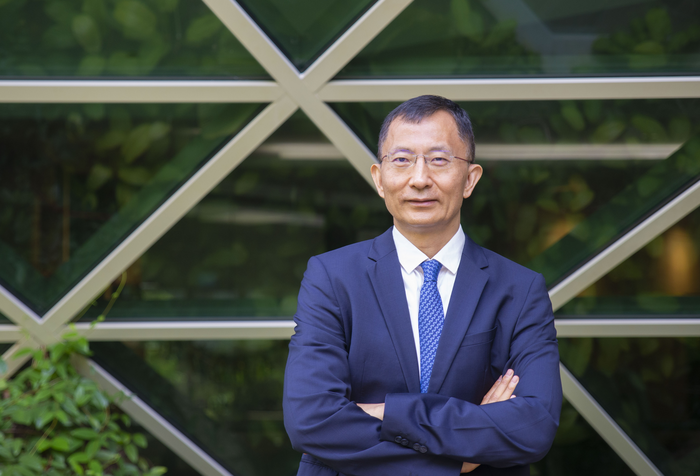The tiny teeth lining the tongues of limpet sea snails are the strongest known natural materials to date – even stronger than spider silk. But what makes the teeth of these rocky shore creatures so strong that a diamond saw is needed to cut them?

Credit: NTU Singapore
The tiny teeth lining the tongues of limpet sea snails are the strongest known natural materials to date – even stronger than spider silk. But what makes the teeth of these rocky shore creatures so strong that a diamond saw is needed to cut them?
A recent study co-led by material mechanics expert Professor Gao Huajian, a Distinguished University Professor at Nanyang Technological University, Singapore (NTU Singapore), has the answer – the teeth’s microscopic structures that include numerous ultra-fine “nanorods” organised in specific patterns.
This is one of many breakthroughs in the nature-inspired scientist’s nearly four decades of research in nanomechanics – the study of the mechanical properties of near atomic-scale structures – for engineering and biological systems.
For his contributions in this field, Prof Gao was elected as a Fellow of the prestigious Royal Society and is the only researcher from a Singapore organisation to become a new member of the society this year.
He joins the ranks of eminent scientists – including Stephen Hawking, Isaac Newton, Charles Darwin, Albert Einstein and Dorothy Hodgkin – who have been awarded Fellowship to the Royal Society. The society is the United Kingdom’s national academy of sciences and one of the oldest scientific academies founded in the 1600s.
Prof Gao, who is from NTU’s School of Mechanical & Aerospace Engineering, is among the 80 researchers, innovators and communicators globally elected as new Fellows of the Royal Society in 2023.
Becoming a society Fellow is akin to winning a lifetime achievement award at the Oscars, with Royal Society members elected for life through a peer review process on the basis of excellence in science.
Prof Gao said: “Being elected as a Fellow of the Royal Society is a huge honour for me – it’s a scientist’s dream. The society is one of the oldest scholarly societies in the world, with legendary scientists among its members like Isaac Newton.”
NTU Vice President (Research) Prof Luke Ong said: “Prof Gao Huajian is a renowned pioneer in nanomechanics and his election as a Fellow of the Royal Society is an important milestone. It is a well-deserved recognition of his contributions in his field and such achievements also underline the University’s strengths in research and innovation.”
Every year, about 800 candidates are nominated by the society’s existing Fellows. The society has about 1,700 members, including around 85 Nobel Laureates.
According to the Royal Society, candidates must have made “a substantial contribution to the improvement of natural knowledge, including mathematics, engineering science and medical science”.
Taking a leaf from nature
Fascinated with figuring out how things in nature worked compared with artificial versions at a young age, Prof Gao has sought to understand the basic principles that control the mechanical properties and behaviours of man-made and natural materials.
One of his biggest discoveries was a model he developed in the 1990s to explain how the size of tiny dents made in a material reflects its hardness. This helped industry players with the quality control of electronic components then, since making dents was sometimes the only way to test the mechanical properties of small parts like computer chips. The 1998 research paper on the model has been cited over 4,400 times.
More recently, his findings in 2022 on what makes limpet teeth so hard lays the groundwork for developing materials that mimic the structure of the teeth. This could allow machining tools to be made that can cut all manner of hard materials like diamond.
Besides limpet teeth, Prof Gao’s research has also uncovered how the size of viruses makes them effective at infecting cells, which resulted in the development of nanoparticles of similar sizes that can target bacteria and possibly be used to kill them.
He has developed models that explain how cells physically change their shape too, such as when immune cells do so to “gobble up” and remove bacteria. This holds promise for developing artificial cells that could be used to mimic the shape-changing characteristics of immune cells.
A prolific researcher with over 500 scientific articles to his name, including those published in prestigious journals such as Nature, Science and Advanced Materials, Prof Gao has received many accolades over the years.
An accomplished multi-award winner
Prof Gao, who is also currently the Scientific Director at the Singapore Agency for Science, Technology and Research’s Institute of High Performance Computing, was recognised by the American Society of Mechanical Engineers (ASME) with the 2021 ASME Timoshenko Medal, the highest recognition in the field of applied mechanics.
Other honours bestowed on the former Stanford and Brown University professor include the Guggenheim Memorial Fellowship in 1995; the Rodney Hill Prize in Solid Mechanics from the International Union of Theoretical and Applied Mechanics and the Alexander von Humboldt Research Award, both in 2012; and the 2015 Nadai Medal, the highest recognition of ASME’s Materials Division.
The former head of the Max Planck Institute for Metals Research has also been elected to the US National Academies of Sciences and Engineering, the American Academy of Arts and Sciences, as well as to other distinguished academies around the world, including the Academies of Sciences in Germany and China.
Prof Gao hopes his research will impact society and spur further studies and development of materials that take inspiration from nature.
“We use a lot of energy to manufacture man-made materials but nature does it differently. It uses less energy to create materials that are mechanically strong because of their sophisticated structures,” he said. “From a sustainability point of view, the natural approach – which uses less energy and creates recyclable materials – is much better.”



